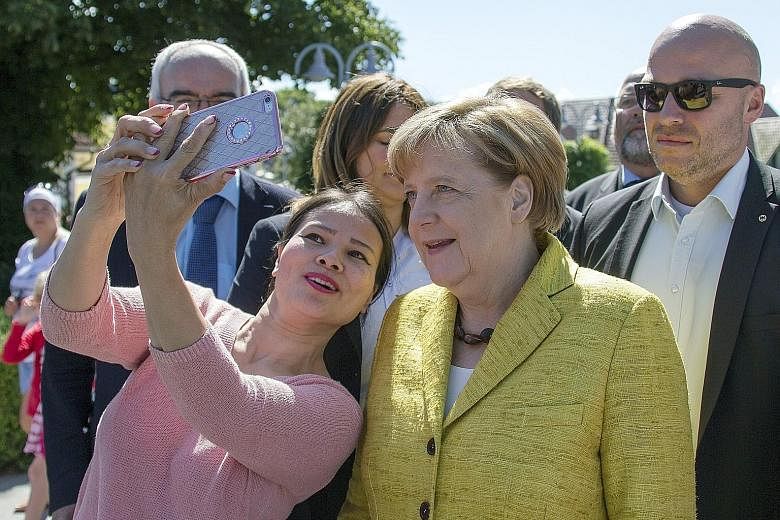With its bulging current account and Budget surpluses, falling long- term debt and record low unemployment rate, Germany is on track for strong economic growth.
But two months before general elections, Chancellor Angela Merkel has come under attack at home and abroad over the European powerhouse's balance sheets.
Leading the charge from abroad is US President Donald Trump, who has complained about America's US$68 billion (S$93 billion) trade deficit with Germany - the second largest after China.
Elected on a promise to bring manufacturing jobs back to America, Mr Trump has accused Germany of hurting the US economy and is threatening to slap punitive tariffs of as high as 35 per cent on German cars.
France has also been grumbling about Berlin's massive current account surplus - which reached US$297 billion last year, the world's biggest. It wants Berlin to invest more across Europe to help growth.
In an interview with Ouest- France newspaper published on the day of Dr Merkel's visit to Paris last Thursday, France's President Emmanuel Macron heaped on the pressure. "Part of Germany's competitiveness is due to the malfunctioning of the euro zone," he said.
-
More voters agree with Merkel
-
Polls in the run-up to the elections suggest that the debate over surpluses is gaining little support in Germany.
Chancellor Angela Merkel's Christian Democrats (CDU) and Bavarian allies CSU are commanding a comfortable lead of 13 points, at 38 per cent ahead of second-placed Social Democratic Party (SPD) at 25 per cent.
With Germany's finances at its strongest since reunification, Germans appear to see little incentive in rocking the boat. And Dr Merkel's conservative alliance is using the strong economic record as a key message for the upcoming vote.
Pointing to data in 2005, when more than five million people were unemployed at a rate of 12.6 per cent, Dr Merkel noted that the figure has halved in June to 2.5 million, a 5.5 per cent rate.
"We're not satisfied with this success... We are setting an ambitious target: We want full employment for Germany by 2025 at the latest," said her conservative alliance in its election campaign programme. But crucially, it has pledged to refrain from taking on new debt for the next four years if elected while also vowing to pump money into education, research and infrastructure.
Shrugging off SPD's call for binding investments, Dr Merkel said on Sunday that the problem is not a shortage of money but that overly long planning processes as well as complicated legal procedures were holding up investments.
Neo Hui Min
He urged Berlin to "take action like France is taking action" to meet its "shared responsibility to give the euro zone the future that it deserves".
Germany "should push for a relaunch of public and private investments in Europe", said Mr Macron.
At home, Mr Martin Schulz, Dr Merkel's main challenger in the Sept 24 elections, called for investments to become legally binding.
"After the brakes on debt, we need a minimum figure for investments," the leader of the Social Democratic Party (SPD) said on Sunday, urging more funds to be put into improving Internet connections, roads, renewable energy and education.
Summing up the problem, British liberal weekly The Economist said in a cover titled "The German problem" that the trouble is that "Germany saves too much and spends too little. And the size and persistence of Germany's savings hoard makes it an awkward defender of free trade".
But the Germans appear little moved by their detractors.
In an editorial titled Let's Not Infantilise Germany's Trade Surplus, the country's biggest business weekly, Handelsblatt, hit out strongly at The Economist.
If Berlin is mindful of keeping tabs on its debt, it is acting out of prudence due to massive demographic changes in the coming years as baby boomers leave the job market and become pensioners, it argued.
It noted that no one in Germany, including Finance Minister Wolfgang Schaeuble, is against greater investments in improving domestic infrastructure or education.
Germany has, in fact, been pumping money into raising living standards in the former communist east to those in the west in the years since reunification.
But "the point is that erasing a trade deficit equal to 8 per cent of GDP with public spending is not credible", said Handelsblatt.
Economists from Ifo Institute for Economic Research, including its president, Mr Clemens Fuest, also said the critics' arguments are misplaced. "Claiming that Germany should do more is based on the view that countries with a current account surplus or low fiscal deficits should feel morally obliged to stimulate global demand.
"All countries hesitate to pursue fiscal policies which are not in line with the national economic interest, not just Germany. In addition, using fiscal policy to stimulate demand now would come at the price of higher public debt, undermining growth prospects and resilience in future crises," they wrote.
For the moment, German economists are calling for a bit of patience, saying it is only going to be a matter of time before the imbalances reverse, given Germany's ageing population.
"If Germany does yield to foreign pressures and takes steps to reduce its current account surplus, it should focus on reversible measures," warn the Ifo experts.
"The oil price may rise again, and as Germany's population ages and the baby boomer generation retires, the German current account surplus may soon be a thing of the past."

